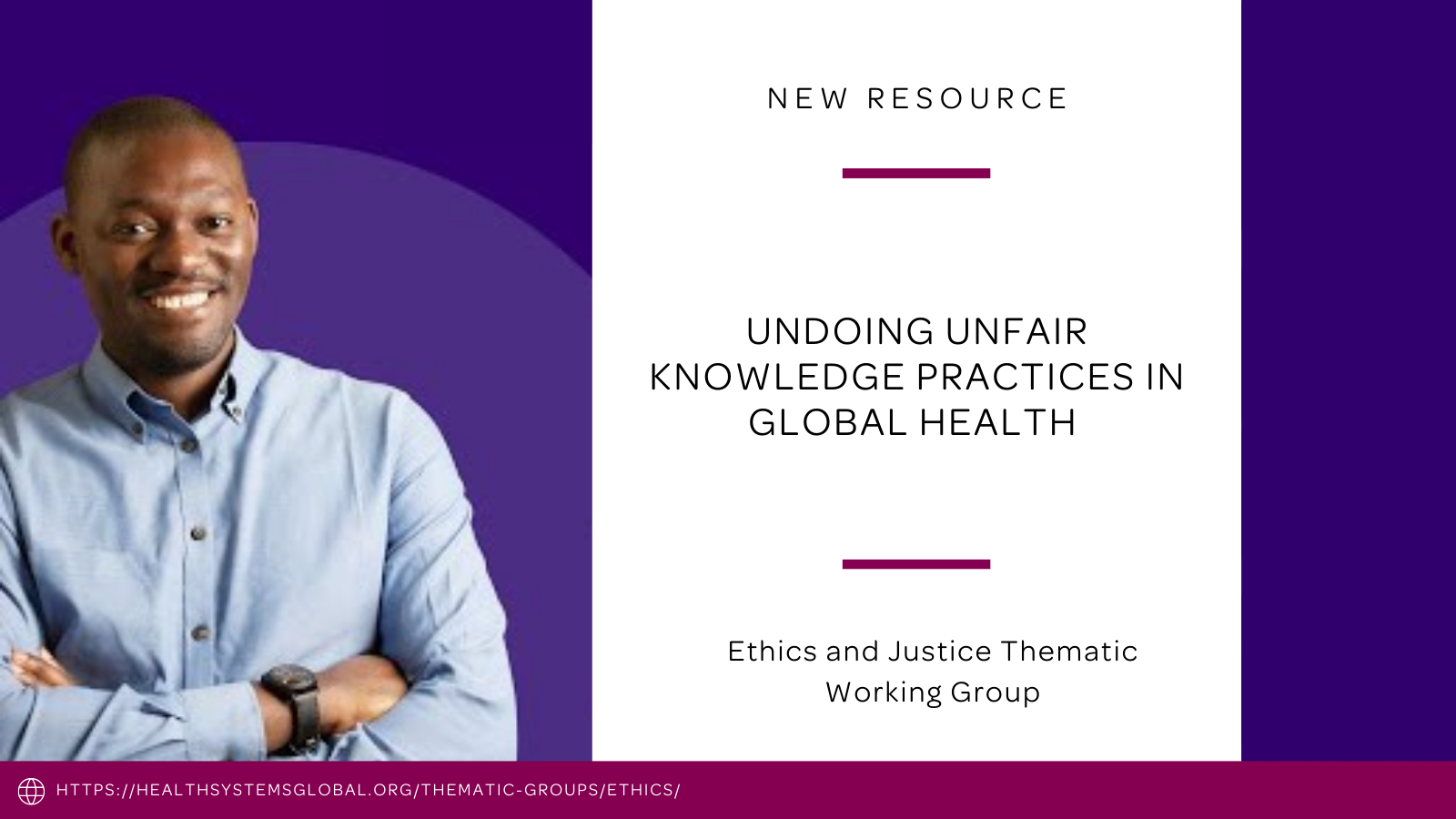Progress
Health systems researchers are the type of people that want to solve problems. Often, they have a vision of a better world and this inspires them in their work. The values that guide them might include social justice, the reduction of inequities, or improvements in wellbeing.
Creating more healthy societies is about more than the fixing of a particular illness – it is about transformation, revolution, and seismic change. Working together is an opportunity to profoundly re-organise the way health systems work which can impact upon the societies that they serve.
Many of the resources in this section consider how we should decide which research areas are a priority by assessing their relative benefits. For example, the blog (2016) and paper by Benatar (2017) challenge health researchers consider economic, cultural and political systems in their work and link it to planetary health and ecological systems as a catalyst for positive change.
The paper by Barsdorf and Millum (2017) advances the idea that ethical health research should focus on those most effected by ill-health and those interventions which would benefit the largest number of people. We have included a paper by van de Pas et al. (2017) which explores whether the recent drive for health systems ‘resilience’ takes us nearer or further away from an approach that prioritises equity, global solidarity and justice.
Pratt (2014) suggests that health systems researchers’ efforts to take an equitable approach are hampered by the need to meet global targets that may not align with local need and a one-size-fits all approach to capacity development. This argument is advanced and elaborated on in paper by Pratt and Hyder (2015).
Pratt et al.’s (2015) review of 104 researchers to assess how equity orientated their practice in low- and middle-income countries suggests that there is room for improvement, particularly in terms of the selection of populations upon whom to focus studies. Also included in the resources is Pratt and Hyder’s (2017) assessment of the Maternal and Neonatal Implementation for Equitable Health Systems (Manifest) project and its relation to “research for health justice”.
The editors of the special section of the Health and Human Rights Journal highlight that the dynamics of global health fieldwork and the nature of the relationships that emerge through it have been conspicuously under-explored in global health scholarship. Their focus is on the ways in which participants interact and experience the work of global health. It is an effort to shed light on some of the ethical challenges of fieldwork and to explore terrain that might lead to practical ethical guidance for global health fieldworkers. The articles present a wide array of global health fieldwork ethics challenges, which powerfully illustrate the ways in which global health has not adequately addressed on-the-ground ethics, as well as point to important points of entry to improve our ethical practices and to develop clear guidance and support for fieldworkers in global health.
Useful resources

Why should we be concerned by internalised racism in global health?
Internalised racism constitutes an adoption of beliefs about one’s inferiority, weaknesses or shortcomings as a function of racial hierarchy affecting one’s identity and self-worth, thoughts, emotions and behaviours. Internalised racism stems from widely known and discussed institutional racial discrimination, which perpetuates epistemic injustice, social injustice and health inequities in global health. In this article, reflecting […]

Undoing Unfair Knowledge Practices in Global Health
Hear from Seye Abimbola as he discusses undoing unfair knowledge practices in global health. Dr. Seye Abimbola is a health systems researcher from Nigeria. He is currently based at the University of Sydney in Australia, where he is an associate professor and principal research fellow. His teaching and research focus on knowledge practices in global […]

How to address the geographical bias in academic publishing
The commitment by the global health community to promote equity in research, publishing and practice is a welcome addition to the discourse on decolonising global health. Bibliometric analysis of authorship and prime authorship positioning (first and last) has demonstrated that researchers from low-income and middle-income countries or the Global South are under-represented in academic publishing highlighting the need for […]

Health system resilience: a critical review and reconceptualisation
This Viewpoint brings together insights from health system experts working in a range of settings. Our focus is on examining the state of the resilience field, including current thinking on definitions, conceptualisation, critiques, measurement, and capabilities. We highlight the analytical value of resilience, but also its risks, which include neglect of equity and of who is bearing […]

What is a justice-oriented approach to global health?
Calls for justice-oriented approaches to global health gained momentum and visibility during COVID-19. For many years scholars and community leaders have been discussing and debating the ideas of health equity and social justice, but with the COVID-19 pandemic the social and health injustices suffered by millions around the world came into a sharp relief in […]

Knowledge from the global South is in the global South
In social systems or spaces, distance between the centre and the periphery breeds epistemic injustice. There are growing accounts of epistemic injustice in health-related fields, as in the article by Pratt and de Vries. The title of the article asks: ‘Where is knowledge from the global South?’ Like me, you may answer by saying: ‘Knowledge […]

Global Health’s Identity Crisis
Global Health’s Identity Crisis Lately, the field of global health–led by journals like the BMJ Global Health that often set the discourse–has opened itself up for introspection. Researchers and writers from around the world have been critiquing the field, its theory and praxis. As encouraging as this attempt at introspection and critique is, it runs the risk […]

Transcending global health dogma: an Indigenous perspective
Current perspectives on global health are largely determined and advocated for by people or institutions in Europe or in the USA. Those determining the questions are not diverse, which results in hegemonic solutions for the entire world. Sometimes, on the basis of the arbitrary and problematic comparative category of income alone, a single generalised solution is recommended […]
Dialogical reflexivity towards collective action to transform global health
The COVID-19 pandemic has shone a spotlight on existing systemic inequities, both in terms of health inequity and broader socio-economic inequities.1 There have been calls globally not just to build back better but to do so in a way that dismantles structural inequities. Abimbola et al have outlined facets of supremacy, encompassing coloniality, patriarchy, racism, white supremacy and saviourism, […]
What role can health policy and systems research play in supporting responses to COVID-19 that strengthen socially just health systems?
To say that we live in turbulent times is a massive understatement. COVID-19 ruthlessly exposes the fault lines of health services and systems, and the responses put in place to prevent its spread or mitigate its effects may affect people more than the actual infection. The outbreak in Wuhan quickly grew to a pandemic that […]
Research for Health Justice: an ethical framework linking global health research to health equity
Global health research should generate new knowledge to improve the health and well-being of those considered disadvantaged and marginalised. This goal motivates much of the global health research being undertaken today. Yet simply funding and conducting global health research will not necessarily generate the knowledge needed to help reduce health disparities between and within countries. […]
Justice: a key consideration in health policy and systems research ethics
Health policy and systems research (HPSR) is increasingly being funded and conducted worldwide. There are currently no specific guidelines or criteria for the ethical review and conduct of HPSR. Academic debates on HPSR ethics in the scholarly literature can inform the development of guidelines. Yet there is a deficiency of academic bioethics work relating to justice in […]
Special Section on Global Health Fieldwork Ethics and Human Rights
In April 2018, a group of 29 global health researchers and practitioners from various disciplines, institutions, and career phases—from students to CEOs—came together for the Workshop on Ethically Managing Global Health Fieldwork Risks held at Agnes Scott College in Decatur, Georgia, USA. All the participants had worked in global health, and experienced situations in the […]
A time for global health ethics
In this blog Benatar argues that a shift in attention from individual health to population health requires new ways of thinking inclusive of our interactions with the biosphere and planetary sustainability. He suggests that, “current global crises include the instability of a fraudulent global economic system; wide disparities in health, disease burdens, human well-being and suffering; […]
“Not Everything That Is Faced Can Be Changed, but Nothing Can Be Changed Until It Is Faced”: A Response to Recent Commentaries
Given the unsatisfactory and unpredictable nature of progress, and the critical state of the world, ongoing consideration of alternative possibilities for better social systems continues. ‘Imperial common sense’ should be challenged and widespread support generated for use of our capacity to do better for global/planetary health through ‘rethinking the traditional bureaucratic model of postwar intergovernmental […]
The Social Value of Health Research and the Worst Off
In this article we argue that the social value of health research should be conceptualized as a function of both the expected benefits of the research and the priority that the beneficiaries deserve. People deserve greater priority the worse off they are. This conception of social value can be applied for at least two important […]
Interrogating resilience in health systems development
The Fourth Global Symposium on Health Systems Research was themed around ‘Resilient and responsive health systems for a changing world.’ This commentary is the outcome of a panel discussion at the symposium in which the resilience discourse and its use in health systems development was critically interrogated. The 2014–15 Ebola outbreak in West-Africa added momentum for […]
Connecting Health Systems Research Ethics to a Broader Health Equity Agenda
This editorial identifies three areas of ethical tension in health systems research: 1) the dominance of global targets in priority setting which may crowd out health systems research that is responsive to local needs in favour of research on service delivery and scale up of interventions geared to support the achievement of global goals like […]
Applying a Global Justice Lens to Health Systems Research Ethics: An Initial Exploration
Recent scholarship has considered what, if anything, rich people owe to poor people to achieve justice in global health and the implications of this for international research. Yet this work has primarily focused on international clinical research. Health systems research is increasingly being performed in low- and middle-income countries and is essential to reducing global health disparities. […]
Promoting equity through health systems research in low- and middle-income countries: Practices of researchers
Health systems research is increasingly identified as an indispensable means to achieve the goal of health equity between and within countries. While conceptual work has explored what form of health systems research in low and middle-income countries (LMICs) is needed to promote health equity, there have been few attempts to investigate whether it is being […]
Linking Participatory Action Research on Health Systems to Justice in Global Health: A Case Study of the Maternal and Neonatal Implementation for Equitable Health Systems Project in Rural Uganda
An ethical framework called “research for health justice” provides initial guidance on how to link health systems research in low- and middle-income countries to health equity. To further develop the largely conceptual framework, we tested its guidance against the experience of the Maternal and Neonatal Implementation for Equitable Health Systems (Manifest) project, which was performed […]

